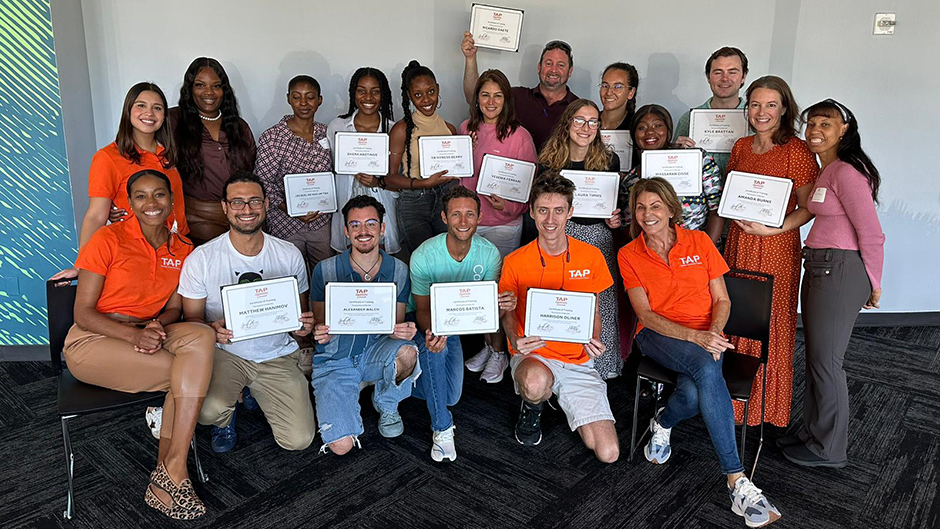Daymara Fernandez, B.S. ’23, never considered teaching as a career until an innovative collaborative program through the University of Miami School of Education and Human Development changed her direction. “I wanted to work in chemistry or math,” said Fernandez. “When I heard about the Teacher Accelerator Program (TAP), I was excited about the opportunity to become a teacher.”
Fernandez, who teaches ninth- and tenth-graders algebra and math foundational skills at South Miami Senior High, is an example of how the TAP program is addressing the national teaching shortage, by offering encouragement, skill-building sessions, and ongoing support to first-year teachers so they can improve the lives of their students.
Miami philanthropist Leslie Miller, founder and president of Achieve Miami, initially approached Laura Kohn-Wood, dean of the School of Education and Human Development, with the idea of TAP in 2022. Along with Teach for America, they developed the partnership between the University and the community.
“Preparing UM seniors, who previously didn’t think about teaching, to serve as Miami-Dade County Public Schools (MDCPS) educators is one of the most significant things we can do to ensure every child in our community has a smart, caring, and committed teacher,” said Kohn-Wood. “The TAP program at UM addresses two needs–providing our students a path to a career and helping address the critical teacher shortage in our community.”
Since its launch last year, the TAP program has changed the career trajectories of other University seniors who were not already pursuing a career in education. It includes a spring semester course and a paid summer internship that paves the way to a guaranteed teaching position with MDCPS.
As an undergraduate, Daymara enjoyed tutoring middle and high school students in math and taught remedial algebra during her summer internship. Now, she looks forward to helping them learn math skills in her high school classroom. “My favorite moment is when my students go “ooh” and a concept just clicks for them.”
Learning new skills
For Alex Walch, B.A. ’23, an eighth-grade world history teacher at Citrus Grove K-8 in the Little Havana area of Miami, the TAP program was instrumental in preparing him for entering the classroom. “I had been focused on international studies and Spanish,” he said. “The TAP program touched on everything to do with education, from academic policies to lesson planning to serving children from disenfranchised neighborhoods.”
During his summer training in collaboration with Teach for America, Walch practiced classroom skills while observing teachers in action. “It helped me understand what kind of teacher I wanted to be,” he said. “Plus, the TAP team and staff are super-supportive, always willing to reach out and to respond whenever I had a question.”
The TAP program also helped Walch understand why some students struggle with the lessons. “Many times, they are scared to fail, don’t know how to ask for help, or are having a hard time at home,” he said. “So, I listen to them and try to build rapport, even with students who are considered troublemakers at my school.”
Fostering a love of teaching
A native of New Jersey whose grandmother was a teacher, Abby Bosland, B.S. ’23, was a senior majoring in psychology and global health when a TAP representative told her, “Give us a minute, and we might change your life,” she said. “I listened, and it changed mine.”
Originally a second-grade teacher and now a third-grade instructor at Eneida M. Hartner Elementary School in Miami’s Wynwood neighborhood, Bosland fell in love with teaching–thanks in part to the preparation and support provided by the TAP program. “I learned a lot about dealing with children from varied socioeconomic backgrounds,” she said. “One of the best things I have learned is that students can succeed when you can connect with them and hold them to high standards.”
For instance, one second-grader only knew five letters of the alphabet and could only write the first two letters of his name, Bosland said. By the semester's end, he could write on the board, copy the words, and participate in class. “Kindergarten through second grade is such a vital time in their reading growth,” she added. “It is so rewarding to see what a child can achieve with the right guidance and support.”
For more information, visit the Teacher Accelerator Program.

